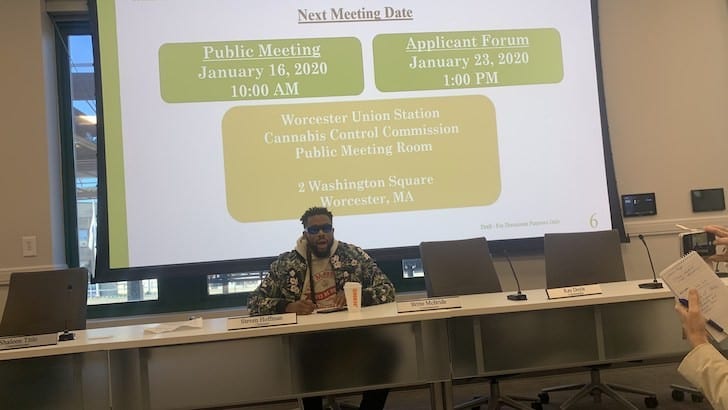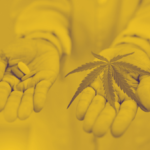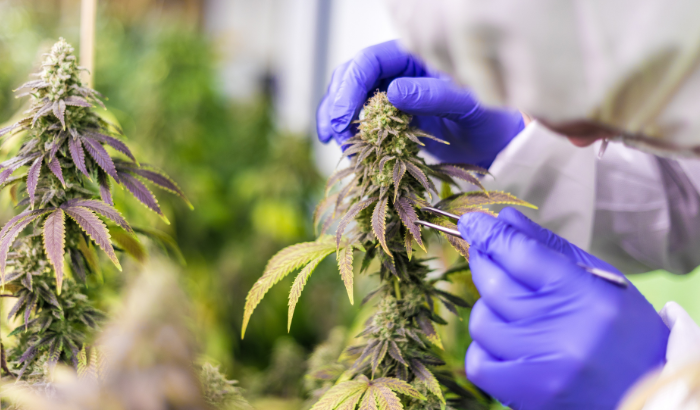
Last Thursday’s Cannabis Control Commission meeting brought the new year in with a bang.
There was a feeling of dread in the room, even before the CCC gaveled in its proceedings. All five of the commissioners did not seem upbeat or cheerful, which was a noticeable shift in tone.
At the commission’s final meeting last year, on Dec 19, chairman Steve Hoffman adjourned the session after Leah Daniels, who is trying to open Alchemy League, an economic empowerment cannabis business, protested by reading a compelling letter to the room. For her actions, Daniels was ruled out of order by Hoffman.
The dream that Daniels started off with, like that of other economic empowerment applicants, has languished in the purgatory of a 600-plus day wait without any communication from the CCC. Despite the commission’s stated goals for its economic empowerment and social equity programs, which were explicitly designed to boost the standing of those most affected by the drug war during the permitting process, there is not a single such applicant currently operating in Mass (despite the dozens in line).
In light of such delays, it is no surprise that applicants have taken drastic measures to bring their agony to the attention of the CCC. The disruption of last Thursday’s meeting—the second since December—reflects the desperation some applicants feel due to the devastating financial impact of being forced to linger indefinitely in the license queue. With few exceptions, applicants must maintain, and pay rent, on facilities that sit empty just to be afforded the privilege of waiting (for some, rent runs as high as $6,000 per month).
So far, the application process has played out like a tragedy, in which applicants are often a minority within a minority. How many black and brown people have had their lives ruined by racist laws and the people they serve? A lot, yet the Commonwealth cannot even begin to accommodate the very people who lawmakers, spurred by cannabis equity advocates, purportedly aimed to assist.
Before last week’s disrupted meeting was adjourned, the commission hastily voted to approve the agenda from the previous session: more than two dozen provisional licenses, shepherded toward the promised land with no public debate or, by extension, accountability. “I feel badly for the 31 people that were affected by this,” Hoffman said. The CCC chair added: “I also understand the frustrations that people feel about the process. We have been responsive to those frustrations in terms of changes to our regulations, prioritization. … Categories of licenses are available exclusively to economic empowerment and social equity applicants. … We’ve been trying to do things and we’ve made changes, we’ve listened.”
On the other side of things, Gerald Nwosu, an attorney, entrepreneur, and musician, said, “My sister is a veteran and she’s been trying to get her cannabis licence. I call her my sister because as a black man, every black woman is my sister. She’s been waiting 600 days for a response while she’s burning through capital. The last thing I want is for them to put a veteran woman in jail. So I’m here. I’ll be the bad guy.”
I asked Nwosu what he hoped to gain.
“Give an answer,” he said. “Be accountable. Tax dollars pay their salary. There needs to be a clear-cut process. The process for a white man and a black veteran woman needs to be equal.”
As long as there continues to be no operational EE or SE businesses in the Commonwealth, this pattern of protests will continue. That despite the reaction of innumerable cannabis “entrepreneurs,” all those armchair Tom Bradys who think they could have demonstrated more effectively, or who believe the language and tone of the protests was out of line. Even in a nation that was founded on violent protest, there always seems to be a problem when black men or women defend themselves.
It seems loud swearing should be the least of concerns in a time rife with unfettered racism. In any case, following the interruptions, I asked people online about what they believe protesters could and should have done better. The only consensus: They were too “loud”; they were full of “expletives.”
Let’s not get too far away from the basics, though: The Commonwealth legalized cannabis (for the most part) a few short years ago. Part of that legislation was supposed to be used to alleviate the harm enacted by generations of racist policies.
Instead, after more than four years, Mass is failing many of the communities that were supposed to benefit from the legalization of cannabis. We’ve been bamboozled, hoodwinked, and led astray, but it’s a new year, and if members of the cannabis community keep fighting, they may see certain reform, at least on some fronts.
Members of the US cannabis community, if it is an actual community, must put aside their racially tinged outrage and hunt down the real monsters in the room.
























